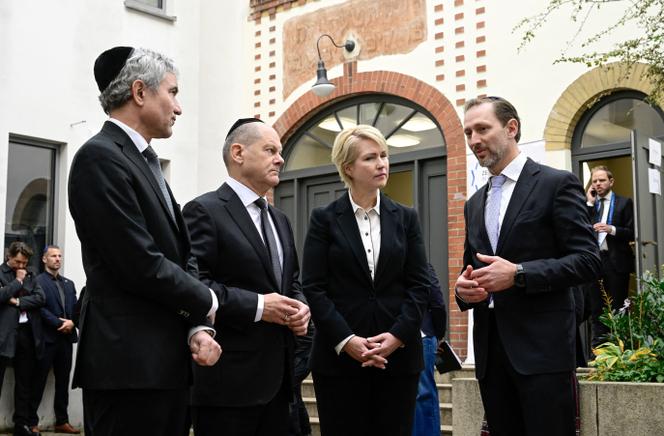


Across Germany, in schools, city halls, synagogues, churches and parliament, people came together on Thursday, November 9 to commemorate the 85th anniversary of Kristallnacht − or the "Night of Broken Glass" − in 1938, in which the Nazis terrorized Jews throughout Germany and Austria.
Chancellor Olaf Scholz and Germany's main Jewish leader, Josef Schuster, spoke at an anniversary ceremony at a Berlin synagogue that was attacked with firebombs in October.
"Jews have been particularly affected by exclusion for centuries," Scholz said in his speech.
"Still and again here in our democratic Germany − and that after the breach of civilization committed by Germans in the Shoah," they are being discriminated against, the chancellor added, referring to the Holocaust by its Hebrew name.
"That is a disgrace. It outrages and shames me deeply," Scholz said. "Any form of antisemitism poisons our society. We do not tolerate it."
The commemoration of the pogrom comes at a time when Germany is again seeing a sharp rise in antisemitism in the wake of the Israel-Hamas war, which started with an October 7 Hamas incursion in southern Israel that killed 1,400 people. Israel responded with a relentless bombing campaign in Gaza that has killed thousands of Palestinians.
On November 9, 1938, the Nazis killed at least 91 people and vandalized 7,500 Jewish businesses. They also burned more than 1,400 synagogues, according to Israel's Yad Vashem Holocaust memorial.
Up to 30,000 Jewish men were arrested, many of them taken to concentration camps, such as Dachau or Buchenwald. Hundreds more killed themselves or died as a result of mistreatment in the camps years before official mass deportations began.
Kristallnacht was a turning point in the escalating persecution of Jews that eventually led to the killings of six million European Jews by the Nazis and their supporters during the Holocaust.
"I was there during Kristallnacht. I was in Vienna back then," Holocaust survivor Herbert Traube said at an event marking the anniversary in Paris on Wednesday.
"To me, it was often repeated: 'Never again.' It was a leitmotif in everything that was being said for decades," Traube said, adding that he is upset both by the resurgence of antisemitism and the lack of a "massive popular reaction" against it.
The German government has been one of Israel's staunchest supporters since the October 7 attack, and Scholz and other leaders have repeatedly vowed to protect Germany's Jewish community.
